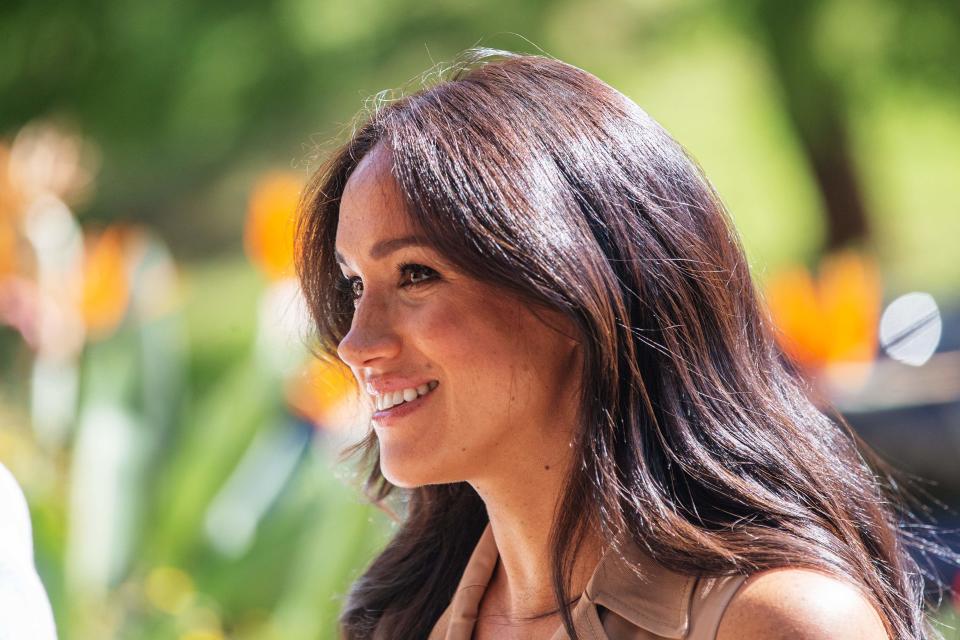'It's good to be home': Duchess Meghan leads interview on fixing race, gender issues in newsrooms
Duchess Meghan of Sussex, who with husband Prince Harry has had problems with the media, played media interlocutor on Thursday when she asked some of the questions during an online discussion of race and gender issues in the media.
In the process, we got to hear a fair amount of excited talk from Meghan herself, including: "It's good to be home," she said, after 10 years living abroad, with the last three in the United Kingdom.
Now that she's back in the U.S., she said she's encouraging everyone to vote in November. Harry, she said, has never voted in his life (as per custom for British royals who are barred from getting involved in politics). She said she's been talking recently with feminist Gloria Steinem, a new friend.
She decried "clickbait" headlines and the "toxicity in the economy of attention" that ignores whether a media story is true or not, a possible allusion to the Sussex ongoing battles with U.K. tabloids. And she hailed the advent of new online platforms as a potential remedy to the kind of media coverage that helped drive her and Harry from their royal roles.
"We want to have trust in journalism and what we're reading, and (instead) we're getting all this stuff and it becomes noise as opposed to truth and accurate journalism," she said.
The former Meghan Markle, who briefly wanted to become a journalist before she became a TV actress, interviewed Emily Ramshaw, CEO and co-founder of The 19th*, a new non-profit online publication launched this year by women journalists and focused on women and politics.
(The 19th refers to the amendment to the constitution extending the right to vote to women, celebrating its 100th anniversary this year. There's an asterisk attached to signal that in practice at first, the right to vote was granted only to white women.)
Appearing via video link from her new home in California, Meghan, 39, wrapped up the last panel of the last day of the week-long virtual summit, "The 19th* Represents," by interviewing Ramshaw about "transforming" newsrooms.
Meghan, whose hair was noticeably longer, wore a sleeveless orange top and gold bracelets on one wrist, which viewers could see as she moved her arms around during her animated discussion with Ramshaw.
The latter admitted, "I'd be lying if I didn’t say this is completely surreal" being interviewed by a leading news figure like Meghan.

Ramshaw said The 19th* is a nonprofit, non-partisan news platform founded by women, staffed mostly by women and intended to cover news about all of women's shared interests and commonality.
"You're capturing the moment in extraordinary way, and even looking at all the risks, you did it," Meghan enthused. "There’s a lot to celebrate you doing that. Women's voices being part of the storytelling is so key."
Earlier, Ramshaw told CNN and other outlets that Meghan had contacted her about participating in the summit. "I nearly fell out of my chair," Ramshaw said. "The duchess basically said that the issues that we care about are issues that she's really interested in this moment," including "super-high-quality media, gender equity, racial justice."
Like any canny journalist, Ramshaw, a fellow graduate of Northwestern University and the former editor of the Texas Tribune, got in a few questions herself for Meghan:
"What's it like coming back to the United States (now), as a biracial woman?" Ramshaw asked. It was "sad and devastating" to see the country "in such a state" of division, Meghan replied.
"But the sadness is shifting to inspiration because I see the tide is turning," she said. "It's not new (to me) to see the undercurrent of racism and unconscious bias, but to see the changes being made is something I look forward to using my voice to promote, which I've not been able to do lately," she grinned.
Meghan and Harry, who quit their royal roles and moved to North America in March seeking more independence and privacy, are now living in Santa Barbara County, in the pricey enclave of Montecito where their friend Oprah Winfrey dwells when she's in California.
The Duke and Duchess of Sussex are known critics of the tabloid media, especially in the United Kingdom where they are suing three tabloids alleging invasion of privacy, copyright infringement, past phone hacking and other violations of British media laws.
But no sooner had they arrived in Los Angeles County, where Meghan was born and raised, then they became alarmed when multiple drones allegedly operated by paparazzi – "dronerazzi," as they are known in Hollywood – began dive-bombing the backyard of their borrowed estate above Beverly Hills in pursuit of pictures of their baby, Archie, who turned 1 in May.
So they filed another lawsuit in Los Angeles against unnamed media photographers seeking to stop the sale or purchase of any pictures of Archie that might become available. They are arguing that the First Amendment doesn't apply to drones being used to invade their privacy – by peering inside their home – which is illegal under California law.
Meghan, now one of the most famous women in world as the first American biracial divorced former actress to marry into the British royal family, might have been slightly overshadowed by the first speaker scheduled on the afternoon panel: Sen. Kamala Harris of California, in her first interview since she was picked by presumed Democratic presidential nominee Joe Biden as his running mate.
Harris, 55, also is biracial (her mother was born in India and her father was born in Jamaica), and is the first Black or South Asian American woman to be on a national presidential ticket.
This article originally appeared on USA TODAY: Meghan Markle interviews The 19th editor on media, race issues

